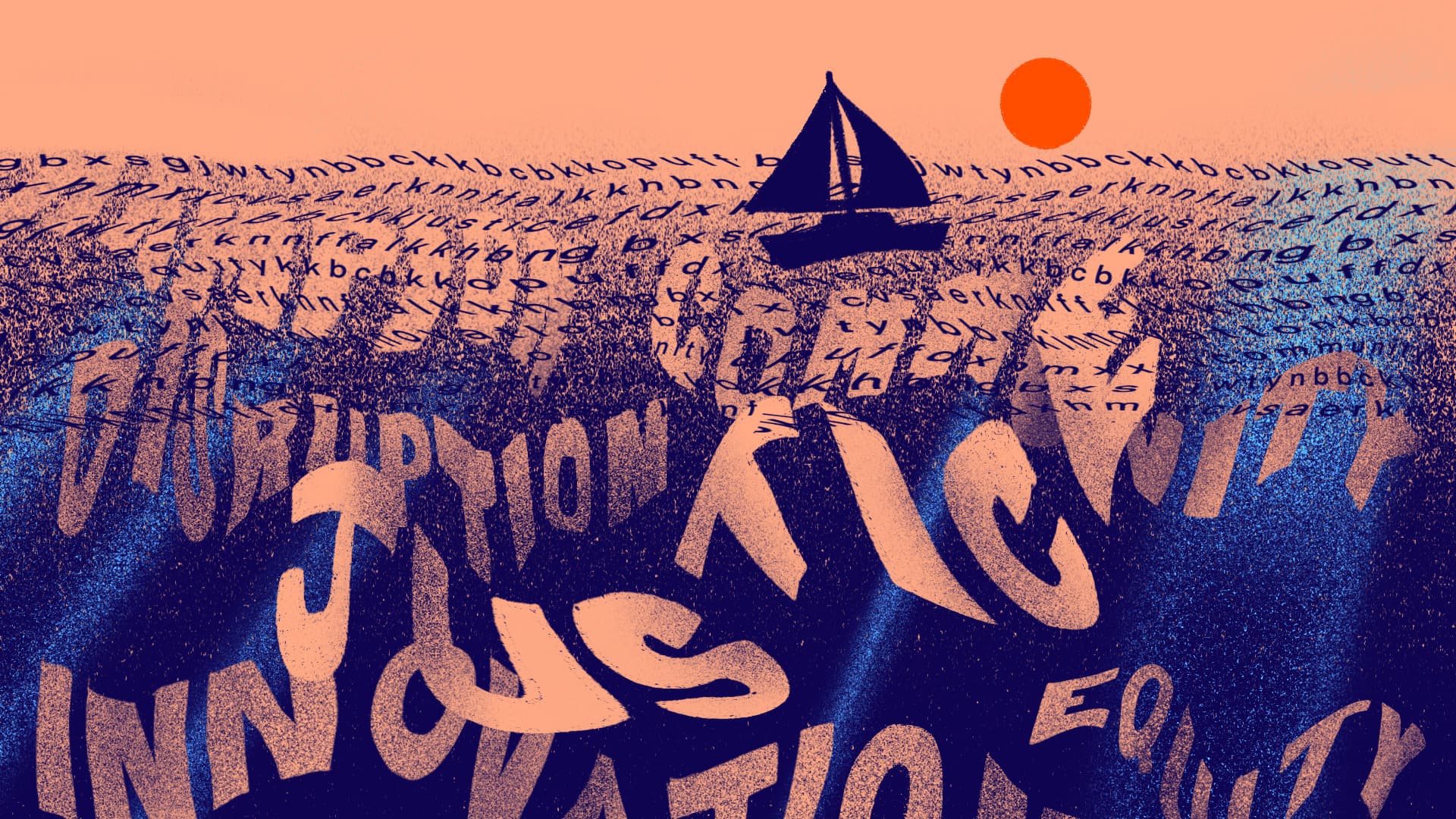By Sruthi Sadhujan, Senior Strategy Director at Hyperakt
How frequently do you and your colleagues use words like these: “innovation,“ “in community,“ “transformation,“ “champion,“ “proximate,“ “dollars out the door,“ “disruption?“
Jargon is technical slang that holds specific meaning to one group, but may be interpreted completely differently by outsiders. Jargon isn’t inherently bad. It can help bring like-minded individuals together around a similar cause, giving them shared language and verbal shortcuts for working together. While jargon can feel both natural and easy in our everyday lives, its presence is often a sign of a lack of clear thinking. Excising jargon can actually lead to sharper thinking, which in turn can breathe life and meaning into your communications.

Illustration by Merit Myers
Jargon Obscures Our Thinking
Jargon has the power to obscure what is actually powerful about our stories and messages. Take, for example, a client of ours that is an intermediary philanthropy. For those not familiar with this term, intermediary philanthropies connect donors to causes and communities they care about and increase the impact of their grantmaking. This organization had long been referring to itself (internally and among its key stakeholders) as an “intermediary.” Over time, the team had come to believe that the word “intermediary” not only felt like an overly technical industry term, it also brought up negative associations of a “go-between” or a “middleman.”
But our brand research revealed that stakeholders valued the organization’s unique connections, data, and research. These were all the reasons why intermediaries exist to begin with–to fill a knowledge gap in the funding landscape. As we dug deeper, we landed on an important insight, a reframing of the concept of “intermediary.” In its role as a conduit between those who have money and those who need the money, this philanthropy was actually serving to decrease inequities in grantmaking. The use of the word “intermediary” was obscuring a powerful story. By examining it more closely and with fresh eyes, both staff and leaders were able to see their work differently and reclaim what it had always been: an intermediary with the influence and potential to redistribute power and money in more equitable ways.
Reconsidering jargon doesn’t always mean blacklisting words from further use or greenlighting for continued use. As I said before, this was not a case of an overly technical inside word being used in external communications. Rather, reconsidering jargon simply meant critically examining long-used words to reconnect with their origin and intended meanings. Deep inside the words that have become routine and thoughtless may lie a wealth of knowledge and hidden stories worth telling.
Jargon Blunts Our Emotions
Once you’ve identified what you want to say, then there’s the challenge of how to say it. Jargon can get in the way at this step as well. It can often make communication feel stale, even though we may not be aware of it.
For an example, take a look at this pretty standard mission statement:
We advance the fight for equity and justice. We work in community with those most impacted and lift up their voices to shift paradigms toward transformative solutions that give everyone a fair and equitable chance at dignity and the pursuit of happiness.
Heavy-handed mission statements, replete with words like “lift up,” “impacted,” “shift paradigms,” and “transformative,” are everywhere. The words “equity” and “justice” have become so commonplace in organizational communications that our brains gloss over them. What do we really mean when we say the “struggle for equity and justice”? What is the core issue? What’s the context? Why does it matter?
Let me not oversimplify. What we’re really talking about here is that Black people and people of color do not have the same educational opportunities as white people in our country. So why not state it in plain language, like this:
“People want a fair shot at a college degree or other credentials that allow them to learn, grow, and thrive. But opportunity isn't equal: It depends on who you are and where you come from. In light of the country's enduring legacy of racism and structural barriers to achievement, we must all do more to make opportunity real for Black, Hispanic, Latino, and Native American people.”
Major props to Lumina Foundation, who, through this example, provide a masterclass on dejargonizing your organizational language. Reading their mission statement feels like a breath of fresh air, a welcome respite from the heavy-handedness of the words in the previous example. Not only is it easier for me to grasp, it grounds me in why this work matters. I am reminded of the first principles of equity and justice — that in our current world, opportunity is not a human right for all, but a privilege for the few. In connecting with what is really at stake here, I feel reinvigorated by this mission.
Words get stale quickly. They lose their value, their bite, their snap, and their punch. Revisit your words regularly and pay attention to how they make you feel as you’re reading them. Did your eyes race over them and just fill in the gaps with preconceived notions? Can you dispose of the big, trendy words and get to the heart of the matter with simple, powerful language?
Jargon Alienates and Excludes People
What’s really at stake when words start hindering rather than helping our communications? We risk erecting walls that keep out the people we need and value the most. Jargon has a way of gatekeeping. When used intentionally, it provides a common language that makes working together easier. But this strength often moonlights as a weakness, turning what brings people together into something that keeps people out.
In yet another brand project with a foundation, a grantee we interviewed made a powerful point about language. To paraphrase: Foundations care about “scale” and “cost effectiveness.” But somebody who doesn't speak like this, but who is doing amazing work, may struggle to get their foot in the door if they don’t use that type of language. In other words, potential grantees don’t always talk about their work in the language of grantmakers. So they are unlikely to see themselves as causes that the institutions might support.
Words can build walls, intentionally or not. Examine your words carefully. In what ways are your words creating unnecessary barriers that exclude individuals and groups who stand to advance and better your own mission?
Reconnect With Your Language Regularly
Jargon has the power to exclude, to confuse, and to disengage — not only internally with our teams, but also among our audiences. It can weaken one of the most critical tools we have at our disposal: communication. Language is at its most powerful when it steps out of the wonky and gets to the heart of the matter. Mind your words carefully. Keep them simple, fresh, and pleasing to the ear.
Our evolving understanding of jargon is but a small part of a larger movement. Language is a living thing; it shifts in response to social upheaval and cultural trends. There is a “New Power-energy” coursing through the veins of our society and it is shining a bright light on the words we use., There is no better time than now to make communications and language more accessible to and representative of all.
As an outside partner, we can help you identify blind spots in your organization like the overuse of nonprofit-ese. Let’s have a conversation — in plain language.


